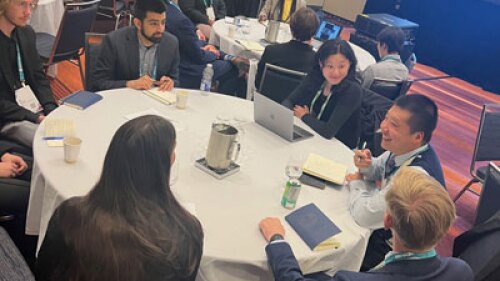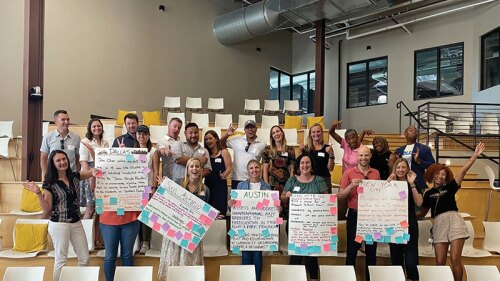Cities across the United States continue to make new commitments to global climate mitigation—240 municipalities have signed on to the We Are Still In campaign, referring to the Paris Agreement, and more than 50 cities now have set 100 percent renewable energy targets for the future.
With buildings accounting for 75 percent of U.S. electricity consumption, achieving these commitments will require the active participation and cooperation of the real estate sector. However, many cities are still in the very early stages of developing new policies and incentive programs to support the real estate industry in transitioning to more energy-efficient building development and management.
As new policies and programs are developed, open channels of communication between the public and private sectors are key to creating smart climate mitigation policy. In response to this opportunity, the ULI Center for Sustainability and Economic Performance hosted a City and Real Estate Sustainability Summit in May in conjunction with the 2018 ULI Spring Meeting in Detroit.
“By convening public and private sector leaders, the purpose of the summit was to highlight innovations in public/private partnerships, build ULI member awareness of city sustainability goals and programs, and identify value-enhancing best practices in city sustainability policies,” said Billy Grayson, executive director of the ULI Center for Sustainability and Economic Performance. The half-day summit featured briefings on successful sustainability programs from leading cities and leading ULI member companies, as well as sessions to help policy makers and real estate leaders understand “how the other side thinks,” and key considerations that drive policy making and real estate investment decisions.
Representing such a large portion of emissions, building owners and developers will be a key sector for cities hoping to achieve their climate goals. “The ultimate goal of a city sustainability program is to make the city more successful, now and for the foreseeable future. By increasing efficiency, reducing waste, and focusing the economy on nondepletable resources, sustainability programs create jobs and improve the quality of life for residents, today and tomorrow. Development projects play a key role in efficiency, waste reduction, and use of renewables; and benefit when they are located in a city offering a great quality of life and a great future,” according to Larry Falkin, director of the city of Cincinnati’s Office of Environment and Sustainability.
During the event, participants gained a better understanding of city sustainability manager and real estate developer processes and perspectives and discussed key sustainability issues like energy efficiency and climate mitigation, resilience, and health. “We were very pleased that ULI was able to organize the first City and Real Estate Sustainability Summit at the ULI Spring Conference in Detroit,” said Jonathan Flaherty, senior director of sustainability and utilities for Tishman Speyer “It is critical for the real estate community to engage with local governments across the country to help shape sustainability agendas at the local level. By engaging with cities, we ensure that cities are well informed about the unique aspects of the real estate sector and how they can play a positive role in addressing climate change and environmental issues.”
A few key takeaways identified during the summit were that developers should be consulted early in the policy-making process, understanding the financing process is key to creating mutually beneficial policies, and that existing buildings should be a larger part of the conversation when looking to reduce emissions from the buildings sector. “I found it extremely valuable to hear directly from the real estate community what policy instruments they find most impactful and how active they want to be in shaping a city’s energy efficiency future. It’s nice to know that these private and public partnerships can lead not just to energy and cost savings on a macro level, but also translate into community benefits such as carbon emissions reductions and overall economic competitiveness,” said Camille Pollan, energy efficiency program manager in the city of New Orleans’s Office of Resilience and Sustainability.
Representatives from a diverse group of cities attended the summit, including Ann Arbor, Michigan; Cincinnati; Cleveland; Chicago; Dearborn, Michigan; Detroit; New Orleans; New York City; Pittsburgh; Reno, Nevada; and South Bend, Indiana. Participants from the private sector included Arup, Bedrock Detroit, Berkshire Communities, Boston Properties, CBRE, Kilroy Realty, LaSalle Investment Management, SWA Group, and Tishman Speyer.
Following the meeting, ULI will continue to engage these industry leaders to identify and create sustainability policies that work for everyone through regular updates and future in-person summits. ULI is looking to convene a second city/real estate sustainability summit in conjunction with the 2018 ULI Fall Meeting in Boston. To apply to be part of future summits and join the Institute’s newest public/private collaboration, visit the ULI Navigator.




